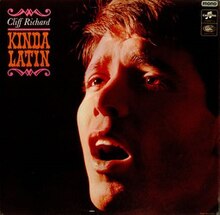Rock and roll music
| Kinda Latin | ||||
|---|---|---|---|---|
 | ||||
| Studio album by | ||||
| Released | May 1966 | |||
| Recorded | October 1965 | |||
| Studio | EMI Abbey Road | |||
| Genre | Traditional pop, bossa nova | |||
| Label | Columbia - SCX 6039 [1] | |||
| Producer | Norrie Paramor | |||
| Cliff Richard chronology | ||||
| ||||
No videos available
Álbums chronology
Kinda Latin
Cliff Richard
Label: Columbia - SCX 6039 [1] · Studios: EMI Abbey Road · Productor: Norrie Paramor
Kinda Latin is the tenth studio album by Cliff Richard, released in 1966.[2] It is his seventeenth album overall. The album reached number 9 in the UK Album Charts in a 12 week run in the top 30.[3]
Reception
Leer másReview
Kinda Latin is the tenth studio album by Cliff Richard, released in 1966.[2] It is his seventeenth album overall. The album reached number 9 in the UK Album Charts in a 12 week run in the top 30.[3]
Reception
Leer más| Review scores | |
|---|---|
| Source | Rating |
| AllMusic | [2] |
| Record Mirror | [4] |
The album was reviewed by Dave Thompson at AllMusic who wrote that "It`s a terrific album, and no mistake". Thompson felt that in comparison to his albums recorded in Italian and Spanish, "Left to his own English language devices, however, Richard`s natural vocal powers can scarcely be faulted - even the most practiced rehearsal can sound like an ad lib, and it doesn`t matter how many times you catch that chuckle at the end of "Blame It on the Bossa Nova," it still seems as natural as breathing".[2]
Track listing
- "Blame It on the Bossa Nova" (Cynthia Weil, Barry Mann)
- "Blowin` In the Wind" (Bob Dylan)
- "Quiet Nights of Quiet Stars" (Antonio Carlos Jobim, Gene Lees)
- "Eso Beso" (Noel Sherman, Joe Sherman)
- "The Girl from Ipanema" (Jobim, Norman Gimbel)
- "One Note Samba" (Jobim, Jon Hendricks)
- "Fly Me to the Moon (In Other Words)" (Bart Howard)
- "Our Day Will Come" (Bob Hilliard, Mort Garson)
- "Quando, Quando, Quando" (Tony Renis, Emilio Pericoli, Alberto Testa)
- "Come Closer to Me" (Osvaldo Farrés, Al Stewart)
- "Meditation" (Jobim, Gimbel)
- "Concrete and Clay" (Tommy Moeller, Brian Parker)
Kinda Latin is the tenth studio album by Cliff Richard, released in 1966.[2] It is his seventeenth album overall. The album reached number 9 in the UK Album Charts in a 12 week run in the top 30.[3]
Reception
| Review scores | |
|---|---|
| Source | Rating |
| AllMusic | [2] |
| Record Mirror | [4] |
The album was reviewed by Dave Thompson at AllMusic who wrote that "It`s a terrific album, and no mistake". Thompson felt that in comparison to his albums recorded in Italian and Spanish, "Left to his own English language devices, however, Richard`s natural vocal powers can scarcely be faulted - even the most practiced rehearsal can sound like an ad lib, and it doesn`t matter how many times you catch that chuckle at the end of "Blame It on the Bossa Nova," it still seems as natural as breathing".[2]
Track listing
- "Blame It on the Bossa Nova" (Cynthia Weil, Barry Mann)
- "Blowin` In the Wind" (Bob Dylan)
- "Quiet Nights of Quiet Stars" (Antonio Carlos Jobim, Gene Lees)
- "Eso Beso" (Noel Sherman, Joe Sherman)
- "The Girl from Ipanema" (Jobim, Norman Gimbel)
- "One Note Samba" (Jobim, Jon Hendricks)
- "Fly Me to the Moon (In Other Words)" (Bart Howard)
- "Our Day Will Come" (Bob Hilliard, Mort Garson)
- "Quando, Quando, Quando" (Tony Renis, Emilio Pericoli, Alberto Testa)
- "Come Closer to Me" (Osvaldo Farrés, Al Stewart)
- "Meditation" (Jobim, Gimbel)
- "Concrete and Clay" (Tommy Moeller, Brian Parker)


























































